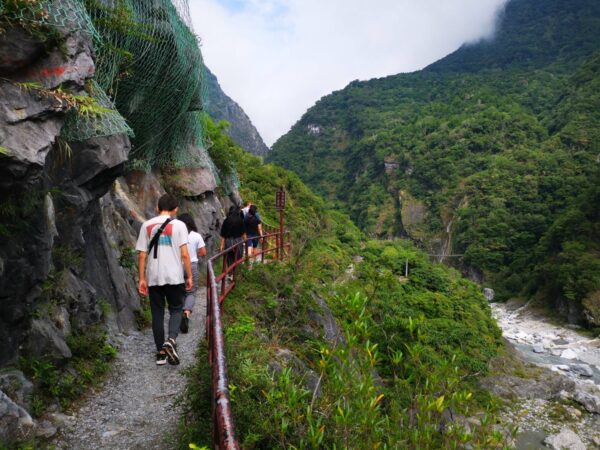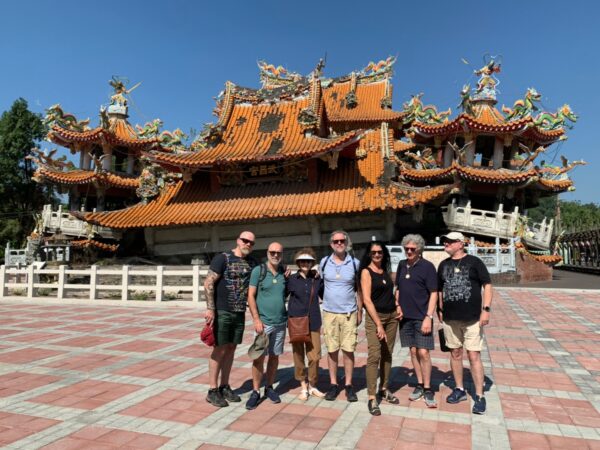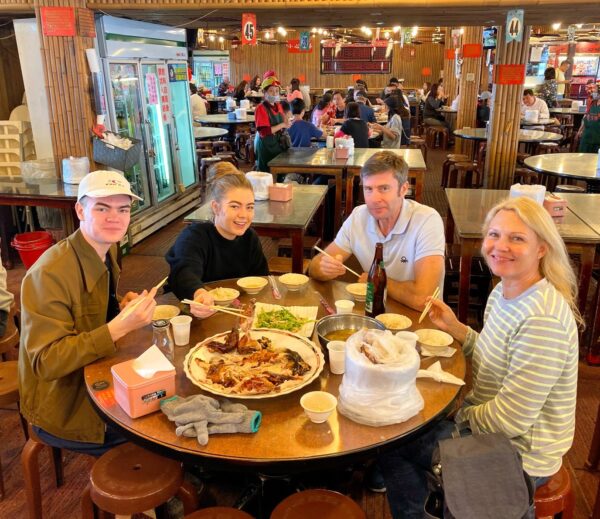We at Life of Taiwan know that nothing is more crucial to our success than the quality and abilities of our guides. In addition to being fully licensed for guiding and also for driving tourists, we require at least five years’ guiding experience in Taiwan, impeccable English (preferably polished through a period spent living abroad) and superb interpersonal skills.
It’s the soft skills of understanding people that make our guides so special. Guiding is a labour of love. If you don’t have a desire to share the wealth of information that you’ve learnt as a guide, it just becomes a robotic recital. Our guides bring Taiwan to life with their unbridled passion for this beautiful island.

Hiking in Taroko National Park
Our guides are trained to know when to be there — and when to let our guests enjoy some family time or time as a couple. They have to be ready to think on their feet. Bad weather sometimes forces road closures. When it rains, that planned hike might not seem such a good idea. In addition to having an excellent understanding of the local terrain, they benefit from a support network that can help them negotiate tough situations seamlessly and excellent intelligence shared by their friends in the guiding fraternity.
Our guides are talented at micronavigation. This means not just finding the temple or the museum, but also finding the most fascinating (and often overlooked) features inside it. When leading older or frailer clients on a private family tour of Taiwan, this may include knowing exactly where to stop the car so as to minimise walking distances — and how to access certain landmarks without confronting steps. In the warrenous back-alleys of a city like Tainan, online maps won’t always get you to where you want to go. A guide worth his or her salt will do just that, pointing out details that appear in no guidebook along the way.
Recently we sat down with three of our most trusted guides to find out how they learned to keep our clients entertained, comfortable, well fed, and intellectually satisfied.
(Re)learning Taiwanese culture
When he began studying to become a licensed guide, the breadth of Taiwan’s fabulously diverse religious culture came as a surprise to Spencer Cheng. ‘The background of certain sects was a complete mystery to me’, says Cheng, a native of Changhua County who’s been guiding Life of Taiwan clients since 2017.
‘As a Taiwanese, I’m used to seeing religious ceremonies and festivals. But not everyone knows the origins of the figures we can see in temples and the reasons why people worship them’, he says. Much of Taiwan’s religious culture derives from southern China and, as Cheng points out, folklore varies from place to place. ‘In the north of a province, compared to the south of the same province, people may well pray to different gods‘.

The earthquake-wrecked Wuchang Temple in Nantou County
During the several years in which Cheng lived in France and the United States, he made an effort to study Western history and culture. ‘Religious monuments and churches and monasteries have always greatly interested me. But it wasn’t until I trained to be a guide that I rediscovered the roots of Taiwan’s local customs and deities. When you grow up in a place, you take such things for granted’.
During his training, Cheng feels he benefitted greatly from specialist speakers. ‘Also, we learned a lot from field trips to famous landmarks and temples with historical significance and rich architectural heritage’, he says. But, he stresses, “learning is an ongoing process. In fact, it’s never-ending.”
People who’ve never worked in the tourism industry might not know the sheer quantity of learning that’s necessary if a guide is to cope with all the possible questions that clients might ask. ‘When facing a travelling audience, you need to develop a methodology to present the information in an interesting way. Each guide has to create his own style’, says Cheng.
All day, day after day
Unlike other professionals who tend to have brief interactions with their clients, professional tour guides typically spend many hours per day for several days running with the same people. ‘This human factor introduces an additional challenge, and the right skills can only be learned and improved through actual working experiences’, Cheng explains.
Emotional intelligence is also required in handling the type of conflicts that may occur when there’s a large group, he says. The smaller the travelling party, the easier it is to make decisions that satisfy everyone — which is why the majority of Life of Taiwan clients prefer our individualised Taiwan luxury tours to fixed-itinerary group excursions.
Asked if he thinks that Taiwan’s guide-training process should be altered or lengthened, Cheng says: ‘In my opinion, it should include more case studies that can teach us how to handle difficulties which arise from customer expectations, as well as situations where crisis management skills are needed’.
Cheng also thinks the final test should ‘focus more on practical knowledge regarding national heritage, nature, and history. There should also be greater emphasis on environment protection, behaviour in public, and sustainable tourism’.
Muchin Lee agrees with much of what Cheng says. Licensed tour guides need to be ‘passionate about life, travel, nature, and culture, otherwise they can only deliver standard speeches at tourist spots, and won’t touch on the truly local and authentic aspects of Taiwan’, she adds.
How can we make our guides even better?

Life of Taiwan clients enjoy a meal
Lee didn’t find any part of training to be a guide especially difficult, she says. Nonetheless, she thinks that those just starting out in the profession would benefit from open discussion sessions during training that cover current economic, political, and social issues. Also, the final exam should move away from multiple-choice questions and require test takers to write essay-type answers. This would better reflect each candidate’s knowledge level and insight.
In addition to a proper grasp of the destination’s history and culture, guides should also get to know the interests and cultural backgrounds of their clients, says Lee, a Taipei native who often leads Israeli visitors on tours of Taiwan. ‘That knowledge, along with the guide’s own extensive travel experience, can result in a truly satisfying private tour of Taiwan‘, she explains.
According to Life of Taiwan regular Steven Liu, a good guide needs to gather information from multiple sources in order to stay abreast of what’s new and what’s popular. It’s not unusual for Life of Taiwan to receive requests from clients who want a place they’ve seen on Instagram or a restaurant they saw featured in a TV show woven into their private luxury tour. Asked if video-sharing sites and social media are among the ways he keeps his knowledge up to date, Liu reflects the enthusiasm that makes our guides so good at their jobs: ‘Yes! If I’ve got time, I’ll do that. I enjoy it a lot’.
Contact our travel experts today to begin tailoring your private tour of Taiwan. We’ll craft an itinerary fully aligned with your interests, pacing, culinary preferences, and accommodation choices. Explore Taiwan’s rich heritage with Life of Taiwan.
